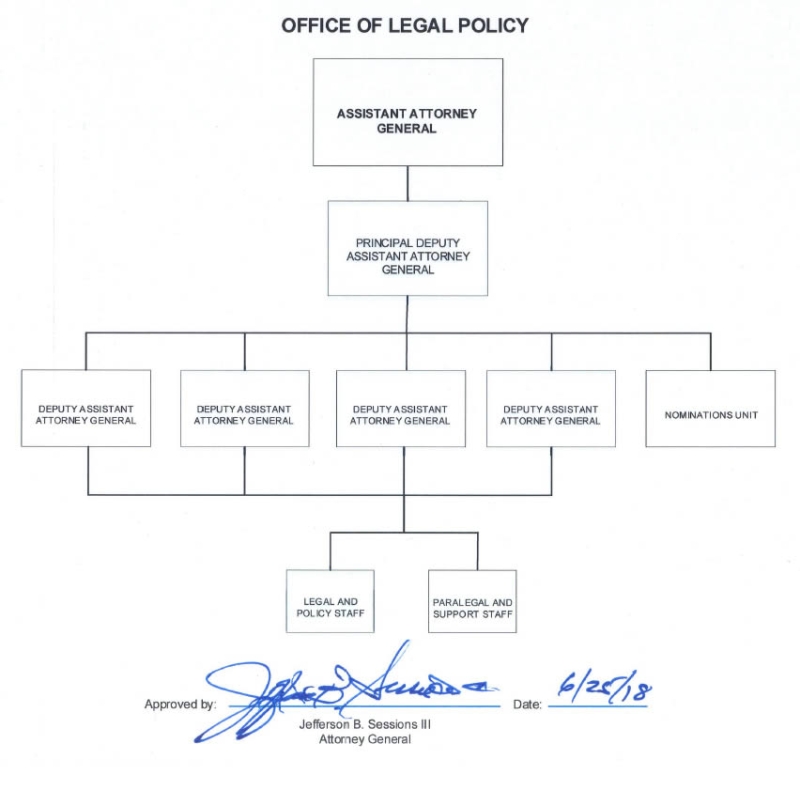Office of Legal Policy

Office of Legal Policy (OLP) Organizational Chart - printable PDF
- Assistant Attorney General
- Principal Deputy Assistant Attorney General
- Nominations Unit
- Deputy Assistant Attorney General
- Legal and Policy Staff
- Paralegal and Support Staff
- Deputy Assistant Attorney General
- Legal and Policy Staff
- Paralegal and Support Staff
- Deputy Assistant Attorney General
- Legal and Policy Staff
- Paralegal and Support Staff
- Deputy Assistant Attorney General
- Legal and Policy Staff
- Paralegal and Support Staff
- Principal Deputy Assistant Attorney General
Approved by Jefferson B. Sessions, III, Attorney General
June 25, 2018
History
The Office of Legal Policy (OLP) was established in 1981 as the principal Department office to plan, develop, and coordinate the implementation of major policy initiatives of high priority to the Department and to the Administration, and to assist the President and the Attorney General in the Administration's judicial selection process for Article III judges. OLP devoted considerable efforts to the areas of criminal and civil justice reform, as had some of its predecessor policy offices (among them, the Office of Criminal Justice, the Office of Policy and Planning, and the Office for Improvements in the Administration of Justice). OLP also supervised the work of the Office of Information and Privacy (OIP) with respect to Freedom of Information and Privacy Act matters.
In 1989, the office was renamed as the Office of Policy Development (OPD), and OIP was established as a separate Department component. For a one-year period, OPD was organized as a component of the newly created Office of Policy and Communications, together with the Office of Public Affairs and the Office of Intergovernmental Affairs. In 1993, that structure was discontinued and OPD was established again as an independent component.
In May 2001, the Attorney General restored the name of the office and confirmed its principal role within the Department.
Mission
The mission of OLP is to develop and implement the Department’s significant policy initiatives, handle special projects that implicate the interests of multiple Department components, coordinate with other interested Department components and other Executive Branch agencies, and serve as the primary policy advisor to the Attorney General and the Deputy Attorney General. OLP also reviews and coordinates all regulations promulgated by the Department and all of its components, assists the Attorney General with responsibilities in recommending candidates for federal judgeships, and coordinates the judicial nomination and confirmation process with the White House and the Senate. As of 2024, OLP also houses DOJ’s emerging technology team, supporting initiatives related to cybersecurity and artificial intelligence across the Department.
Major Funtions
The major functions of OLP are to:
- Develop strategies and programs to implement legislative, programmatic, and policy initiatives.
- Serve as a liaison to the Executive Office of the President and other agencies on policy matters.
- Conduct policy reviews of legislation and other proposals and support and coordinate Departmental efforts to advance the Administration’s legislative and policy agenda.
- Provide support and policy expertise in conjunction with other components to implement effectively major Departmental and Administration initiatives in the criminal and civil justice areas.
- Assist the President and the Attorney General in filling all Article III and certain Article I judicial vacancies.
- Coordinate regulatory development and the review of all proposed and final rules developed by all Department components.
- Serve as liaison to OMB and other agencies on regulatory matters.
- Track and coordinate Departmental implementation of statutory responsibilities and reporting requirements.

